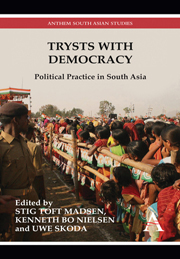Book contents
- Frontmatter
- Contents
- List of Tables
- List of Abbreviations
- Glossary
- Map of South Asia
- Acknowledgements
- 1 Introduction
- Part One Theoretical Issues
- 2 Why did India Become a Democracy and Why did it Remain Democratic? A Survey of the Literature and Some Comments to the Scholarly Debate
- 3 Democracy in Bangladesh: A Village View
- Part Two India
- Part Three Beyond India
- About the Editors
- About the Contributors
3 - Democracy in Bangladesh: A Village View
from Part One - Theoretical Issues
Published online by Cambridge University Press: 05 March 2012
- Frontmatter
- Contents
- List of Tables
- List of Abbreviations
- Glossary
- Map of South Asia
- Acknowledgements
- 1 Introduction
- Part One Theoretical Issues
- 2 Why did India Become a Democracy and Why did it Remain Democratic? A Survey of the Literature and Some Comments to the Scholarly Debate
- 3 Democracy in Bangladesh: A Village View
- Part Two India
- Part Three Beyond India
- About the Editors
- About the Contributors
Summary
– In your view, what are the main characteristics of democracy?
– The vote. That we can eat at affordable prices. Schools and colleges. If there is to be a medical college, then it should be the government's.
– Should ordinary people become MPs?
– To become an MP you need a lot of money. Because [I am] an agricultural labourer, I can never become the Prime Minister. But I shall have my dignity. To be able to stand among everybody else, that is what is right.
This is an excerpt from an interview with an agricultural labourer in a small bazaar town south of Dhaka. The interview was conducted in connection with a survey carried out in his village, to ascertain people's understanding of democracy and of elected representatives. The agricultural labourer's answers contain interesting insight into what villagers such as him think about democracy and the role of elected politicians. First we see that ‘to vote’ (vot deya) is central to how democracy is understood, as the first thing that springs to mind. Secondly we see that ‘to vote’ is immediately followed by other expectations – of food at affordable prices, or perhaps more commonly of infrastructure, schools and other forms of ‘development’. This was characteristic of the answers we had. Democracy and development are notions that were closely connected. A third element has to do with ‘representation’. We found that ordinary people did not feel that ordinary people would make good political leaders.
- Type
- Chapter
- Information
- Trysts with DemocracyPolitical Practice in South Asia, pp. 45 - 70Publisher: Anthem PressPrint publication year: 2011
- 23
- Cited by



